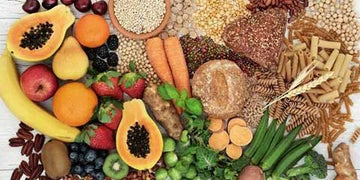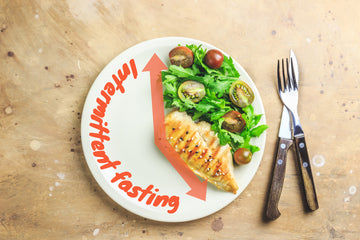by Anthony Benjamin on Oct 12, 2022

Fiber Needs After Bariatric Surgery
Deciding to undergo bariatric surgery may be stressful, but it is worth it. By making small lifestyle and dietary changes, such as incorporating fiber intake to your diet, you can maximize your weight-loss efforts and regulate your digestive system, along with other health benefits.
However, it can be stressful to make lifestyle changes, even if you have already taken the
first step. At ProCare Health, we provide
you with the information you need and answer all of your questions, so you make better
decisions about your fiber intake after bariatric surgery.
Fiber Intake After Bariatric Surgery
Fiber is beneficial to everyone, especially to patients recovering from bariatric surgery. As a plant-based nutrient, fiber is commonly present in foods such as vegetables, fruits, legumes, nuts, seeds and grains.
Typically, high-fiber foods such as fruits and vegetables are low in calories. The fiber they possess slows digestion and passes through the intestinal tract relatively intact. Sources that are rich in fiber regulate your digestive tract and help you feel full faster, so you can combat hunger and maintain a healthy weight.
The Benefits of Fiber Intake After Bariatric Surgery
Fiber has multiple benefits and is essential to any healthy diet, including a bariatric diet plan. Apart from helping your digestive system function properly, high-fiber foods have other health benefits, which include the following:
Manages Weight Loss
High-fiber foods such as brown rice and avocados are more filling than low-fiber foods. By eating high-fiber foods, you spend more time chewing, which slows your pace of eating. They also give your body more time to realize how full you are. High-fiber foods take longer to break down in the digestive tract, which prevents overeating and helps you feel full faster.
Regulates Cholesterol Levels
Soluble, high-fiber foods are ideal for lowering blood cholesterol and glucose levels. Soluble fibers such as Brussels sprouts, apples and pears reduce the absorption of low-density lipoprotein, or “bad” cholesterol levels, into your bloodstream.
Controls Blood Sugar
Soluble fibers slow the absorption of sugar, which can help improve blood sugar levels. By following your bariatric surgery diet and eating high-fiber foods, you can reduce the risk of developing type 2 diabetes.
Prevents Constipation
Constipation is common after bariatric surgery, as there is a significant decrease in fiber consumption. Dietary fiber increases the weight and size of your stool and softens it. A bulky stool is more comfortable to pass and decreases your chance of constipation. If you have loose, watery stools, fiber solidifies the stool by absorbing water and adding bulk to the stool.
The Types of Fiber You Should Eat After Bariatric Surgery
If you are following a bariatric diet plan, it is important to eat high-fiber foods. As an indigestible carbohydrate, fiber is present in most plant-based foods, such as fruits, vegetables, legumes, nuts, seeds and grains.
When considering fiber intake after bariatric surgery, you need to learn everything about the various sources of fiber and how they will affect your recovery. There are two types of fiber: soluble and insoluble. You can find soluble fiber in foods like nuts, seeds, beans, lentils, peas, and some fruits and vegetables. Insoluble fiber is found in wheat bran, whole grains, and vegetables. When planning your menu, try to incorporate more vegetables, fruits and legumes, as compared to nuts, seeds and whole grains.
Vegetables
Low-carbohydrate vegetables are a great way to introduce variety to your diet. By eating vegetables, you can regulate your digestive tract and maintain continuous weight loss. Vegetables with low carbohydrates include spinach, broccoli, kale, peppers, onions, tomatoes and bell peppers.
Fruit
It is vital to consume fruits when following a bariatric diet plan, as compared to fruit juices, which may or may not contain sources of dietary fiber. Fruits can also be higher in calories and sugar, so you should be cautious and only eat high-fiber fruits such as raspberries, pears and apples.
Legumes
Legumes are rich in both protein and fiber. By incorporating legumes and beans into your bariatric diet plan, you can create delicious recipes and still make healthy choices. Examples include black beans, garbanzo beans, kidney beans and lentils.
Nuts and Seeds
While healthy for your diet, nuts and seeds are calorie-dense and add up quickly. Therefore, you should watch your portions and only eat nuts and seeds as snacks. Peanuts, almonds and sunflower seeds are crunchy, salty and a replacement for chips and other snack foods.
Whole Grains
Refined grains such as white bread or white rice may trigger grazing and an excessive intake of calories. You should only consume whole grains like cereal and quinoa. Whole grains contain more fiber than their processed counterparts and contribute to your daily fiber intake. However, you should only eat half of your grains whole to achieve your daily bariatric diet plan.
Integrating Fiber Into Your Bariatric Diet Plan
After bariatric surgery, it can be challenging to consume adequate amounts of fiber every
day. The daily fiber recommendation for adults is 20-35 grams, but you should aim for at
least 15 grams of fiber for every 800-1000 calories you consume.
It can be difficult and time-consuming to incorporate fiber into your weight loss diet plan, but it is still possible.
To learn more about fiber intake after bariatric surgery and how it can benefit your recovery, take a look at our list of tips and tricks:
- In the beginning, increase your fiber intake gradually to avoid bloating, cramping and intestinal gas. Ideally, the transition should last one to two weeks so the natural bacteria in your digestive system can adjust to the change.
- Instead of eating fiber during one meal, spread out your fiber intake throughout the day.
- There are two types of fiber – soluble and insoluble. Soluble fiber is found in nuts, seeds, beans, lentils, peas, and some fruits and vegetables. Insoluble fiber is found in whole grains, vegetables, and wheat bran, among others. There are health benefits to both types of fiber, so incorporate a variety of high-fiber foods into your bariatric diet plan.
- As you increase fiber intake after bariatric surgery, it is essential to drink water throughout the day, since fiber performs better when it absorbs fluid.
- If you have a craving, opt for snacks such as fresh fruit, raw vegetables and low-fat crackers.
- When choosing breakfast cereals, choose high-fiber options that advertise “whole grain” or “fiber” on the box.
It can be challenging to adjust to the bariatric diet plan. If you have issues, contact a ProCare dietician. We will analyze your fiber absorption and pinpoint opportunities for improvement. If necessary, we will also provide you with fiber supplements, multivitamins or other meal replacement options.
At ProCare, we offer a variety of fiber supplements, including the FiberCel Fiber Powder and the TinyMeal Protein Bar. Both products are rich with vitamins and minerals and ideal for fulfilling your nutrient needs daily, even if you are on the go.
ProCare Health is Here for You
At ProCare Health, we know it can be difficult to navigate recovery and weight loss management after bariatric surgery. If you have questions about fiber intake, our bariatric multivitamins, calcium supplements, proteins, vitamins and minerals, or your bariatric diet plan, we are here to help. To speak with one of our qualified professionals, call us at 877-822-5808.

How the Low FODMAP Diet Is Good for Gut Health

What Is Food Noise?


